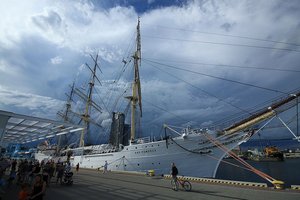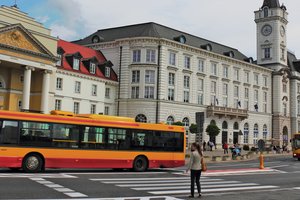Shopping
Shopping in Poland is never a problem – including weekends and late hours. There are super-and hypermarkets in every large city in Poland. Shopping centres operate in every bigger town in Poland. They offer products of Polish and foreign brands. Usually, they are open 7 days a week, often from 8.00 to 21.00, although, there are also shops open 24/7.
Grocery shopping is usually cheaper than in most European countries. It is the cheapest to buy in hypermarkets and on marketplaces. Small local shops are a bit more expensive.
Examples of what you would pay for groceries:
- Bread: PLN 2–5
- Water 1.5l: PLN 2–3
- Milk: PLN 2.5
- Hamburger: PLN 5–10
- Coffee: PLN 5–15
How much you spend in a restaurant depends on its standard and location. In the cheapest places you can eat a one-course meal for PLN 10–20, in restaurants of a higher standard you will pay PLN 50 or more for a three-course meal. Night life is the most expensive in the capital and in large cities, the entry into a club costs PLN 10– 30; you will pay PLN 7–13 for 0.5l of beer and PLN 15–30 for a cocktail.
Cinema tickets will set you back by PLN 15–25, while theatre, opera or concert tickets are more expensive: about PLN 30–100.
Bargaining and tips
In shopping centres and chain stores the customers almost never negotiate prices with the sales personnel. Only in the case of purchasing an expensive product (e.g. electronic equipment) you may try to negotiate a better price. However, buyers may negotiate prices at bazaars, markets or fairs, particularly if they want to buy handicraft products or antiques. With some effort, may you“reach a deal” and get a really good price.
Tips are not mandatory in Poland and there is no obligation to give them. It should only be done when you are satisfied with the service. The usual amount of tips reaches 10% of the bill, in some better restaurants it is automatically added to the bill as the payment for service. Tips for hotel service personnel may be between PLN 5 and 20, depending on the standard of the hotel in which you stay. There is no custom of tipping taxi drivers in Poland.
Age restrictions
In Poland, persons aged 18 or above can buy and drink alcohol regardless of its percentage content. The same applies with the sale of cigarettes. It is not permitted to consume alcohol outside designated premises such as bars, restaurants and beer gardens and you can be fined for drinking in public places. Apart from designated smoking areas in restaurants, smoking in public places – such as bus stops – is forbidden.
Essentially, entrance to night clubs is allowed to people over 18 years of age although there are also clubs where you have to be over 21.
Shopping centres
Both in large cities and small towns, there are local shops where you can buy food and fresh produce. Most of them are open from Monday to Friday, usually from 7.00 or 8.00 to 18.00 and on Saturday to 14.00. They are usually closed on Sundays.
If you need basic products at a very late hour, the best option is to shop at petrol stations which are open 365 days a year, 24 hours a day, even on church and public holidays.
Bazaars
Bazaars are very popular in Poland. You can buy fresh fruits and vegetables there, as well as many other items. Bazaars are most frequently open from Monday to Saturday, and are often located at large housing estates. Bazaars popular in smaller towns are usually open until noon, they are also open for business on the so-called ‘’market days,’’ the dates of which are different for different Polish regions.
Internet Shopping/Buying
You will not have any problems with buying things on the Internet in Poland. Choose shops that have operated in the market for at least a few years, wwith positive customer reviews. Auction services popular in Poland include Allegro.pl, but you can also use e-Bay.
Tax Return
In some shops in Poland, citizens of non-EU countries can get a refund on VAT (Tax Free procedure). These shops are usually labelled – look for a sticker on the door, etc. To get a refund, you must fill out the necessary forms and send them to appropriate institutions. Then – once you return to your country – you can expect to receive a refund.
Gifts from Poland/Cepelia
Gifts from Poland such as amber jewellery, antiques, or Polish handicrafts can be purchased at galleries often located in the historic parts of cities. Stores called "Cepelia" with Polish folk art offer handicraft products: rugs, tapestries, carpets, furniture, ceramics, sculpture, painting, wicker products, glass, jewellery, leather products, etc. These places are worth your time if you are after an original souvenir. It is important to remember that you cannot take any antiques of significant worth (in some cases, this can be as little as 4,000 PLN) out of the country). You must be particularly cautious when attempting to leave with an item over a hundred years old.
10.11.2014







